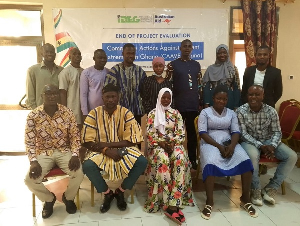 The call was made at an end-of-project evaluation forum organized by IDEG
The call was made at an end-of-project evaluation forum organized by IDEG
Border communities in Bole and Wa West Districts in the Savannah and Upper West regions are calling on the government and stakeholders to increase education on violent extremism threats.
The call was made at an end-of-project evaluation forum organized by the Institute for Democratic Governance (IDEG) to assess the impact of the project named Community Action Against Violent Extremism (CAAVE) in Bole and Wa West districts in the Savannah and Upper West Regions, which was funded by Australian Aid. Participants at the evaluation forum, which was held in Wa on Saturday, December 21, 2024, highlighted the contribution of the project in raising awareness of the threats of violent extremists to the peace and cohesion of their communities.
During the engagement, the Bole and Wa West teams provided valuable insights on how the project activities, particularly the town hall sensitization and publicity materials such as posters, raised community interest and awareness of the issue and the support of traditional leaders to ensure that the indigenes are not exploited. They noted that there was great demand from community members for the posters, with some publicizing and displaying posters at vantage points, on motorbikes, and in marketplaces.
According to Douglas Quartey, the project consultant, violent extremist groups tend to exploit religious differences, ignorance, unemployment, and distrust between citizens and law enforcement agencies to recruit members. Therefore, with the current challenges of climate change on the livelihoods of the people, including youth unemployment, it is imperative that Ghana adopts a more proactive and inclusive approach to counter the threats to peace and stability.
Community leaders crucial in sustaining peace in northern Ghana
The role of community leaders in maintaining social cohesion in northern Ghana has been highlighted by participants at a one-day end-of-project evaluation held in Wa as part of activities under the Community Action Against Violent Extremism (CAAVE) project implemented by IDEG with funding support from Australian Aid.
At the evaluation forum, participants from the project districts of Bole and Wa West shared feedback on the project activities and outcomes achieved. According to the participants, the project was effective because all stakeholders were involved in the process and were interactive as well, adding that the set target was also attained.
They indicated that the outcome of the project was very great since the engagement was educative and sensitization was interactive, with all participants and stakeholders sharing ideas to ensure peace.
Despite the success of the project in contributing to peaceful elections in the project communities, the participants highlighted difficulties in the mobilization of some stakeholders and over-attendance during town hall and sensitization sessions, which contributed to the shortage of publicity materials.
On whether the CAAVE project contributed to peaceful elections in the just-ended polls in those two districts, the participants indicated that: "Yes, because in the district through the sensitization, we did not encounter any violent activities before, during, and after the elections. Members of the various communities in the district are now vigilant and always alert. They report issues and unknown individuals to the various stakeholders responsible. They are also enlightened on violent extremism."
Speaking to journalists at the event, Mr. Sidik Watara, a faculty member of IDEG’s Governance Issues Forum Network (GIFNET), giving an overview of the project, said: "I think the project has made a lot of impact on the lives of these communities. From what we've just heard, you realize that the people of Wa West, the very week that we started this sensitization, took it upon themselves to make sure that they question people that are not known in their communities. Anybody they don't know, that is not familiar, that cannot speak their language fluently, then, they have to question you, what you are doing there.
"So this was replicated in Bole where this assembly member, Hassan, had to drag an unknown person with this questionable character to the police commander, and then he facilitated the deportation of the person back to his community."
According to him, IDEG came up with the Community Action Against Violent Extremism (CAAVE) project with support from the Australian government in order to combat violent extremism within the bordering towns of northern Ghana, especially the Upper West Region and Savannah Region, which are likely to be affected by the spillovers from neighboring countries that are prone to conflict.
"Having in mind that there are so many communities that share borders with our neighboring countries, Burkina Faso and Ivory Coast, these projects targeted the neighboring bordering communities and we selected communities such as Dabor in the Upper West Region, Wechiau, Bankpama and the other communities. These communities and that of Mandari in the Savannah Region, Bole and Doli, all in the Savannah Region were chosen because of their peculiar nature.
"These communities share boundaries with the neighbouring Ivory Coast and people flow in. And because of the multilingual nature of Bole, because they speak so many languages there, people easily settle there. And people who are violent or have a criminal background can easily locate or reside in these communities. As a result, IDEG thought it wise to select these communities to embark on sensitization with the stakeholders, especially the chiefs, assembly members, and the security forces."
Sidiki charged residents in the catchment areas to embrace the project as their own to ensure its sustainability and to continue to be vigilant and conscious of their surroundings to ward off bad elements since the likelihood of having a regular source of funding could not be guaranteed.
Meanwhile, watch as an expert speaks on the types of payment cards and how people can use them this Christmas and New Year below: